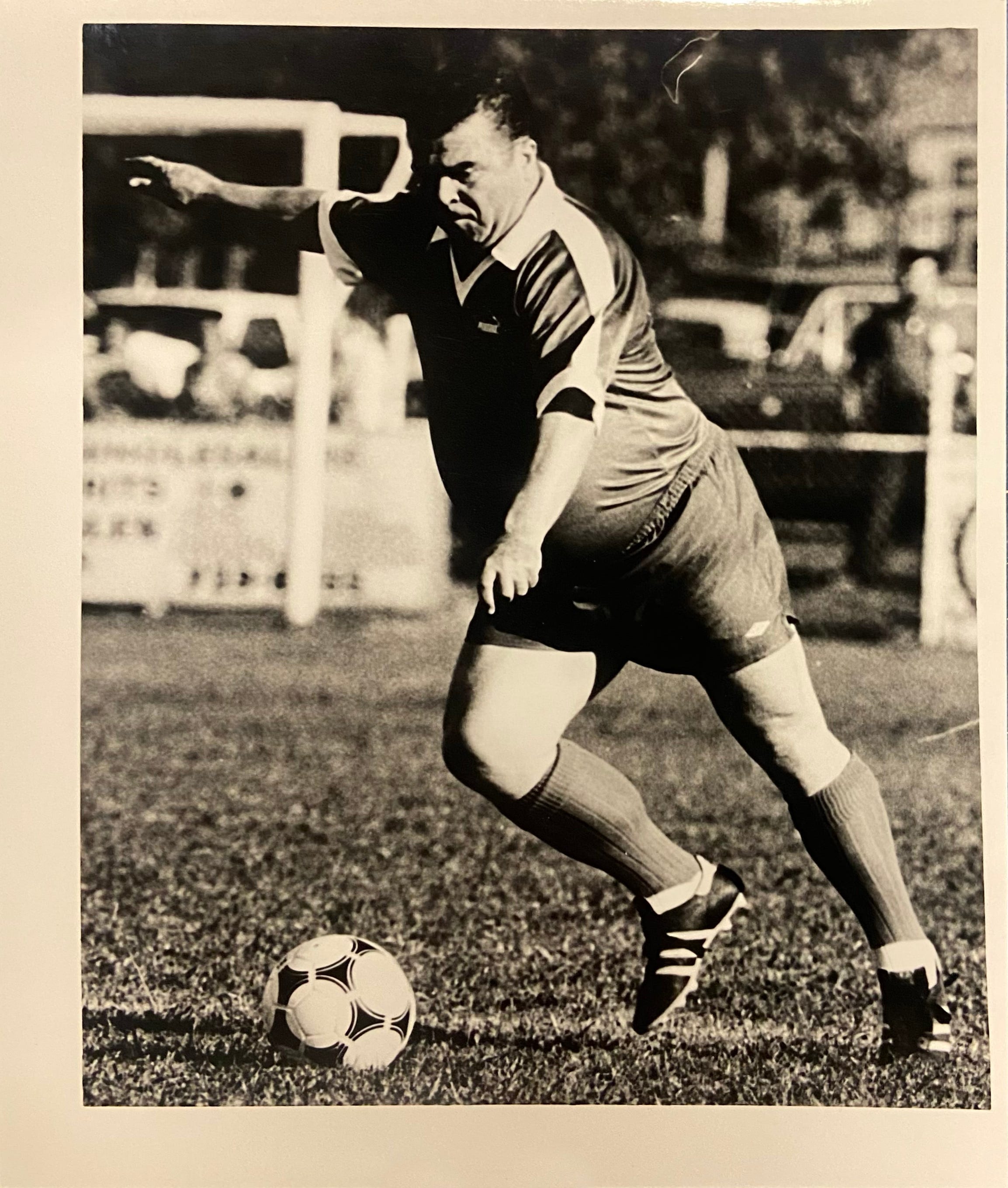When it comes to the golden age of football, one name stands out more than most: Ferenc Puskás. He wasn't just a player—he was a phenomenon. Known as the "Galloping Major," Puskás became a global football icon long before the sport exploded into the worldwide spectacle it is today.
Back in the 1950s and 60s, Puskás was more than just a goalscorer. He was a symbol of excellence, a man who redefined what it meant to be a forward. Whether he was lighting up the pitch for Hungary or dazzling crowds at Real Madrid, Puskás left a mark on every game he played.
From Olympic gold to European Cup triumphs, the Hungarian legend’s career reads like a dream. But how did a kid from Budapest become one of the most revered figures in football history? Let’s dive into the life, achievements, and legacy of Ferenc Puskás.
Table of Contents
- Biography of Ferenc Puskás
- Early Years and Career Beginnings
- International Success with Hungary
- The Real Madrid Era
- Legacy and Impact on Football
- Frequently Asked Questions (FAQs)
Biography of Ferenc Puskás
| Full Name | Ferenc Puskás |
|---|---|
| Born | April 1, 1927, Budapest, Hungary |
| Died | November 17, 2006, Budapest, Hungary |
| Nationality | Hungarian |
| Height | 1.68 m (5 ft 6 in) |
| Position | Forward |
| Clubs | Kispest (1943–1949), Budapest Honvéd (1949–1956), Real Madrid (1958–1966) |
| International Caps | 85 appearances for Hungary |
| International Goals | 84 goals |
| Major Honors | 3 European Cups, 10 National Championships, Olympic Gold (1952) |
Early Years and Career Beginnings
Ferenc Puskás, originally named Ferenc Purczeld, was born in Budapest in 1927. His father worked at a sports club, so it was no surprise that young Ferenc grew up surrounded by football. He started playing seriously as a teenager and joined the local club Kispest in 1943.
Back then, the idea of a footballer being a global superstar was still a distant dream. But Puskás had that spark. Even as a young player, he was known for his speed, accuracy, and an uncanny ability to find the back of the net. By the time he was 20, he was already making waves in Hungarian football.
In 1949, Kispest was taken over by the Hungarian army and renamed Budapest Honvéd. Puskás stayed on, and the club became a powerhouse in Eastern Europe. He was the heart of the team, earning the nickname the "Galloping Major" due to his military rank and his explosive playing style.
International Success with Hungary
The Hungarian national team of the early 1950s was one of the most feared teams in world football. Known as the "Golden Team," they were led by Ferenc Puskás and legendary manager Gusztáv Sebes.
In 1952, Puskás led Hungary to an Olympic gold medal in Helsinki. That was just the start. Over the next few years, Hungary went on a 32-match unbeaten run—a record at the time. Puskás was the team's main weapon, scoring goals with both feet and rarely missing a chance.
At the 1954 World Cup in Switzerland, Hungary was the overwhelming favorite. Puskás was injured in the group stage, but even so, the team made it all the way to the final. In one of the most famous matches in football history, Hungary faced West Germany in the final, known as the "Miracle of Bern." Despite a shocking comeback by the Germans, Puskás and his teammates left a lasting legacy.
- 1952 Olympic Gold Medal
- 1954 World Cup Finalists
- 84 goals in 85 caps (a world record at the time)
The Real Madrid Era
After the 1956 Hungarian Revolution, Puskás fled to Spain and joined Real Madrid in 1958. At the time, Real Madrid was already one of the biggest clubs in the world, having won the first five European Cups.
But Puskás took them to a new level. Alongside stars like Alfredo Di Stéfano and Raymond Kopa, he formed one of the greatest attacking lines in football history. Known as the "Ye-Yé" team, they dominated both domestically and in Europe.
Puskás scored goals like they were going out of style. In his first season with Madrid, he bagged 26 goals in just 21 games. He went on to win three European Cups and five La Liga titles with the club. His 128 goals in 135 appearances for Madrid still make him one of the most prolific scorers in club history.
- European Cup wins: 1959, 1960, 1966
- La Liga titles: 5
- Top scorer in Europe: 1964
One of the most memorable moments of his career came in the 1962 European Cup Final in Amsterdam. At 35 years old, Puskás scored twice, proving that age was just a number for a player of his caliber.
Legacy and Impact on Football
Ferenc Puskás wasn’t just a great player—he was a pioneer. In an era before modern training techniques and global media coverage, he became a symbol of excellence, showing that football could transcend borders and politics.
His playing style was unique. Small in stature but big on heart, Puskás could score with both feet, was a master of timing, and had an instinct for finding space. He was a complete forward before the term even existed.
After retiring, Puskás continued to influence the game as a coach and ambassador. In 2009, FIFA launched the Puskás Award, given annually to the player who scores the most beautiful goal of the year. This award keeps his legacy alive and reminds new generations of the magic he brought to the pitch.
Even today, Puskás is revered in both Hungary and Spain. Statues, stadiums, and even a museum in Budapest honor his name. He was more than just a footballer—he was a cultural icon.
Learn more about Ferenc Puskás’ influence on modern football and why his name still resonates today.
Explore more about the history of Real Madrid legends and how Puskás helped shape the club’s identity.
Frequently Asked Questions
What clubs did Ferenc Puskás play for?
Puskás played for three main clubs: Kispest (later known as Budapest Honvéd) in Hungary, and Real Madrid in Spain. At Honvéd, he was a key part of the legendary Hungarian Golden Team. With Real Madrid, he won multiple European Cups and league titles.
How many goals did Puskás score in his career?
Over the course of his professional career, Ferenc Puskás scored a staggering 746 goals in 754 matches. This includes goals for both club and country. His goal-scoring record was one of the best in football history at the time of his retirement.
Why is there a Puskás Award in football?
The Puskás Award was introduced by FIFA in 2009 to honor the most beautiful goal of the year. It was named after Ferenc Puskás in recognition of his incredible scoring ability and the elegance of his goals. The award celebrates creativity, flair, and the artistic side of the sport.



Detail Author:
- Name : Hortense Fadel
- Username : amaya.skiles
- Email : mellie.dibbert@gmail.com
- Birthdate : 1971-11-26
- Address : 5675 Gage Canyon Suite 543 Port Joanie, NE 22257
- Phone : 573.417.0463
- Company : Pacocha, Schultz and Ryan
- Job : Logging Equipment Operator
- Bio : Tempore aut qui non at. Qui laudantium sunt esse recusandae pariatur maiores.
Socials
instagram:
- url : https://instagram.com/makenzie976
- username : makenzie976
- bio : Iste natus eum quidem sed quo. Itaque nisi ab eaque ut. Occaecati porro ut debitis labore quia at.
- followers : 2087
- following : 392
tiktok:
- url : https://tiktok.com/@makenzie_bogan
- username : makenzie_bogan
- bio : Consequatur dolore odio quidem aut ut voluptatibus ut.
- followers : 4828
- following : 311
facebook:
- url : https://facebook.com/boganm
- username : boganm
- bio : Et porro ipsum voluptas error dolores mollitia.
- followers : 3580
- following : 950
twitter:
- url : https://twitter.com/makenzie5384
- username : makenzie5384
- bio : Voluptate iste qui sit id ut et. Cupiditate in assumenda doloribus ea est quas repellendus. Itaque dolore enim quia ipsa fuga qui.
- followers : 270
- following : 1239

